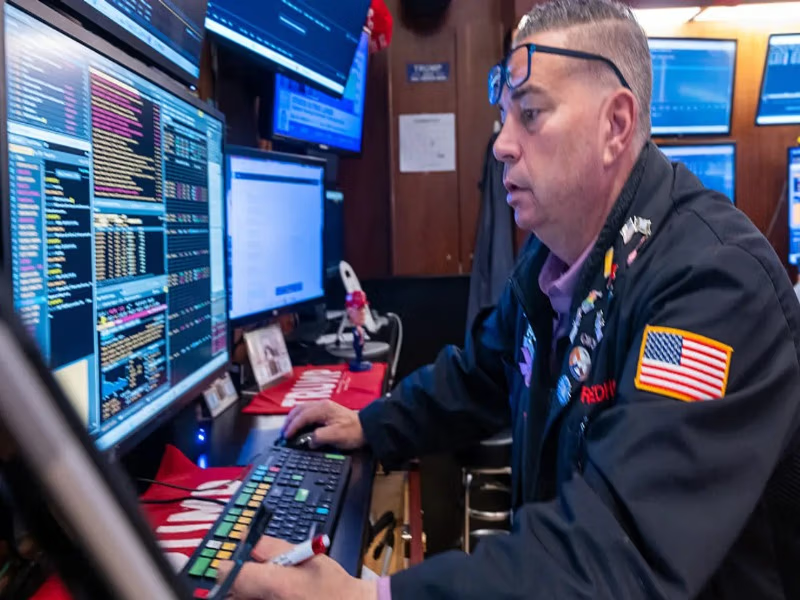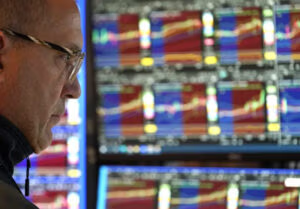The Nasdaq Composite fell on Friday under the pressure of additional losses in stocks on artificial intelligence to lose a week in its wake, as new economic data was released to investors, as concerns of a slowdown.
The tech-heavy index fell 0.21 percent to close at 23,004.54, and the S&P 500 and the Dow Jones Industrial Average inched into the green.
The broad-based index rose 0.13 percent to close at 6,728.80, and the 30-stock index was up 74.80 points, or 0.16 percent, to close at 46,987.10.
The Nasdaq had recovered by 2.1 percent at its lows of the day, compared to 1.3 percent and over 400 points or an approximation of 0.9 percent in the S&P 500 and the Dow, respectively.
Shares rebounded after Senate Minority Leader Chuck Schumer, D-N.Y., presented a fresh proposal to the Republicans, which would allow the historic government shutdown that happened in the United States to come to a close.
The proposal would help to fund operations of the federal government on a temporary basis, in exchange for the one-year extension of the expanded tax credits of the Affordable Care Act.
During the halt, investors are becoming concerned about the strength of the U.S. economy. According to a survey conducted by the University of Michigan, consumer sentiment has approached an all-time low on Friday.
The figures follow one day after the company Challenger, Gray and Christmas announced that the number of layoff announcements made in October was the highest in the period of 22 years.
The economic data front is not giving investors much due to the current shutdown. The Bureau of Labor Statistics would have published the nonfarm payrolls report on Friday.
Economists that are surveyed by Dow Jones were anticipating the report to record 60,000 job losses and a rise in the unemployment rate to 4.5 percent.
The Senate is likely to vote on Friday on the passage of a House-approved stopgap funding measure.
The federal funding lapse has caused economic activity that has threatened the activity since it has led to flight disruptions as a result of air traffic controllers that are working without pay since October.
Transportation Secretary Sean Duffy announced on Wednesday that he will begin reducing flights by 10 percent at 40 large airports beginning on Friday, a decision that may impact 3-5000-4000 flights daily. Therefore, by Friday morning, over 700 U.S. flights were already cancelled.
Chief Investment Strategist of Concurrent Asset Management, informed CNBC that “No one likes the dark, and we’ve been in the dark for a while as far as government data is concerned, but I think we might further have some behavior being impacted. I think that speaks volumes to why valuations should, at least in the short term, continue to erode.”
The three benchmark indexes gained in the red this week, as concerns on high valuation in the tech sector and high concentration market remained.
The Nasdaq fell by approximately 3 per cent over the week-to-date, its worst performance in five days since the index fell 10 per cent by the week ended April 4. Both the S&P 500 and the Dow dropped over 1 per cent in the week.
Some of the most notable laggards on Friday were the top artificial intelligence company, Oracle, which declined nearly 2 percent, and has seen its fall this week to approximately 9 percent.
Advanced Micro Devices, which dropped almost 9 percent on the week, and Broadcom, which fell over 5 percent this week, were also lower.
Major AI companies slowed down on Thursday, as Nvidia, AMD, Tesla, and Microsoft indicated large drops that burdened the overall market.
U.S. major stock averages fell across the board, with the tech-heavy Nasdaq Composite plummeting by 1.9 percent and the 30-stock Dow closing down by nearly 400 points.
“You have had a bit of a rotation, which has been helpful in the value stocks, which kind of leads me to believe that the sell-off isn’t overly concerning with the [‘Magnificent Seven’],” Bennett said, adding that “AI spending is still here.”
“This AI rally that we’ve had I think does resume,” she continued. “It’s hard to call the top, but I don’t think we’re at the end of it.”






